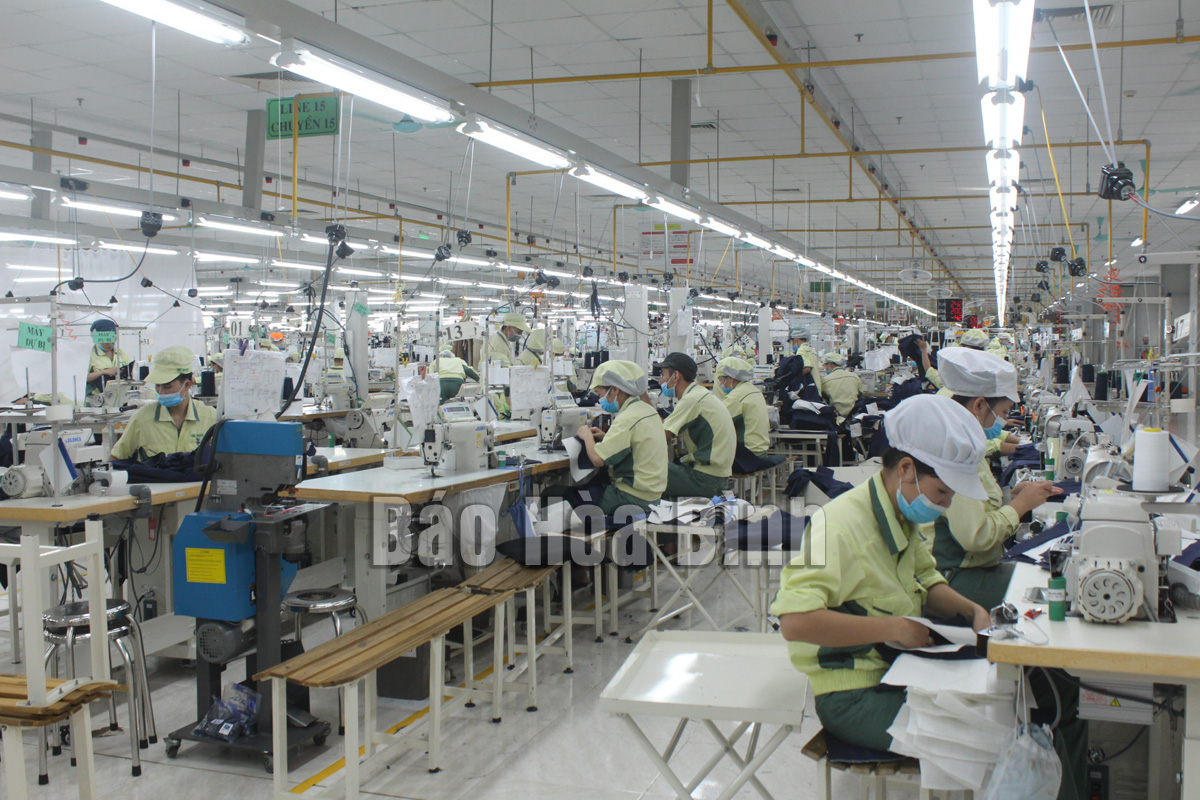
(HBO) – Not only located next to Hanoi capital city and acting as a gateway to the northwestern region, Hoa Binh province also boasts huge potential for developing tourism, agriculture, and industry amid a quick shift in the investment flow from other localities. Therefore, it now holds considerable opportunities to welcome a new wave of investment and become a development centre in the region.

Luong Son district is currently home to 48 investment
projects in its industrial parks, which has created momentum for local
socio-economic development. The photo is taken at the Midori Apparel Vietnam
Hoa Binh Co. Ltd in Luong Son Industrial Park.
Investment poured into the province has been on
the rise in recent years. A large number of domestic and foreign investors,
including major ones, have chosen Hoa Binh as their destination.
Data from the provincial People’s Committee show
that Hoa Binh accommodated 629 valid investment projects funded with non-State
budget capital as of mid-June 2021. They include 40 FDI projects worth over
619.36 million USD and 589 domestic ones worth almost 92.22 trillion VND (4
billion USD).
To attract investment and support major projects
to soon become operational, the provincial Party Committee and People’s
Committee have organised many meetings and dialogues with enterprises and
investors to learn about their situation and direct relevant departments and
localities to tackle obstacles facing their operations.
The administration of Hoa Binh also issued a set
of criteria for selecting investors in projects that use land. These criteria
prioritise investors with sufficient financial strength, experience, and fast
project implementation.
Aside from rolling out the "red carpet” for
investors, the provincial People’s Committee has also ordered thorough
settlement of projects lagging behind schedule, using land ineffectively, or
violating other legal regulations on investment and land.
Competent agencies have considered support for
the projects that failed to meet schedule due to objective reasons such as site
clearance problems and impacts by the COVID-19 pandemic. They were asked to
only consider and approve the project adjustments proposed by investors who
have realised their commitments and met all the regulated standards./.
Dao Village’s honey – a product certified with a 3-star OCOP (One Commune One Product) rating by Thong Nhat Agricultural Cooperative in Dao Village (Hoa Binh City) – is highly regarded by consumers for its quality, richness, and variety in packaging. The distinctively sweet taste of Dao Village’s honey leaves a lasting impression on anyone who has tried it.
In alignment with Project No. 07-DA/TU, issued by the Hoa Binh provincial Party Committee on November 1, 2021, Lac Thuy district has actively promoted investment and supported the sustainable development of its industrial and handicraft sectors during the 2021–2025 period. Alongside this, the district has remained committed to preserving and revitalising traditional craft villages.
Located in the northern part of Lac Thuy district, with a temperate climate and fertile soil, Phu Thanh commune has great potential and advantages in growing tea. The long-standing experience, combined with strict adherence to organic farming practices in the tea gardens, ensures that the dried tea products from Phu Thanh and Lac Thuy as a whole are sold out immediately upon production, providing a stable and prosperous life for the local people.
Amid efforts to streamline the administrative apparatus, Hoa Binh province has intensified measures to address challenges in land clearance, resettlement support, and infrastructure investment, aiming to speed up the progress of key projects.
Hoa Binh province has posted an unprecedented economic growth rate of 12.76% in the first quarter of 2025, marking its highest quarterly performance to date and positioning it as the second fastest-growing locality in the country, trailing only Bac Giang province.
Under current regulations, products in the One Commune – One Product (OCOP) programme that are rated three stars or higher must undergo re-evaluation every three months. However, in reality, some of these products fail to consistently meet the required standards, raising concerns about the sustainability of their OCOP certification. This underscores the urgent need for producers to enhance product quality and gradually develop their OCOP products into strong, marketable brands.



